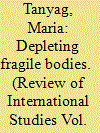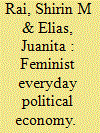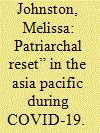|
|
|
Sort Order |
|
|
|
Items / Page
|
|
|
|
|
|
|
| Srl | Item |
| 1 |
ID:
160882


|
|
|
|
|
| Summary/Abstract |
In a crisis-prone world, the number of internally displaced persons (IDPs) uprooted by both armed conflicts and environmental disasters has drastically increased and displacement risks have intensified. Despite the growing attention within global security and development agendas to sexual and reproductive health and rights (SRHR), there remain striking gaps in addressing SRHR in crisis situations, particularly among IDP women and girls. This article examines the continuum between social reproduction in times of crisis and the material and ideological conditions that restrict women’s bodily autonomy in everyday life. Using the case of the Philippines where millions of people are routinely affected by conflict and disaster-induced displacements, it argues that the failure to recognise the centrality of women’s health and bodily autonomy not only hinders the sustainable provision of care and domestic labour during and after crisis, but also fundamentally constrains how security is enacted within these spaces. Thus, the article highlights an urgent need to rethink the gendered political economy of crisis responses as a building block for stemming gendered violence and depletion of social reproductive labour at the household, state, and global levels.
|
|
|
|
|
|
|
|
|
|
|
|
|
|
|
|
| 2 |
ID:
164975


|
|
|
|
|
| Summary/Abstract |
It goes without saying that feminist International Political Economy (IPE) is concerned in one way or another with the everyday – conceptualised as both a site of political struggle and a site within which social relations are (re)produced and governed. Given the longstanding grounding of feminist research in everyday gendered experiences, many would ask: Why do we need an explicit feminist theorisation of the everyday? After all, notions of everyday life and everyday political struggle infuse feminist analysis. This article seeks to interrogate the concept of the everyday – questioning prevalent understandings of the everyday and asking whether there is analytical and conceptual utility to be gained in articulating a specifically feminist understanding of it. We argue that a feminist political economy of the everyday can be developed in ways that push theorisations of social reproduction in new directions. We suggest that one way to do this is through the recognition that social reproduction is the everyday alongside a three-part theorisation of space, time, and violence (STV). It is an approach that we feel can play an important role in keeping IPE honest – that is, one that recognises how important gendered structures of everyday power and agency are to the conduct of everyday life within global capitalism.
|
|
|
|
|
|
|
|
|
|
|
|
|
|
|
|
| 3 |
ID:
098629


|
|
|
|
|
| Publication |
2010.
|
| Summary/Abstract |
Within the polarised and contentious debate over future oil supply a growing number of commentators are forecasting a near term peak and subsequent decline in production. But although liquid fuels form the foundation of modern industrial economies, the growing debate on 'peak oil' has relatively little influence on energy and climate policy. With this in mind, the UK Energy Research Centre (UKERC) has conducted an independent, thorough and systematic review of the evidence, with the aim of establishing the current state of knowledge, identifying key uncertainties and improving consensus. The study focuses upon the physical depletion of conventional oil in the period to 2030 and includes an in-depth literature review, analysis of industry databases and a detailed comparison of global supply forecasts. This Communication summarises the main findings of the UKERC study. A key conclusion is that a peak of conventional oil production before 2030 appears likely and there is a significant risk of a peak before 2020.
|
|
|
|
|
|
|
|
|
|
|
|
|
|
|
|
| 4 |
ID:
098276


|
|
|
|
|
| Publication |
2010.
|
| Summary/Abstract |
This paper compares and evaluates fourteen contemporary forecasts of global supply of conventional oil and provides some observations on their relative plausibility. Despite the wide range of modelling approaches used and multiplicity of assumptions made, it is shown that forecasts can be usefully compared along two dimensions, namely: shape of future production profile and assumed or implied ultimately recoverable resource of conventional oil. Other differences between forecasts are either secondary or are components of these two parameters. The paper shows how large differences in the assumed size of the resource make relatively little difference to the timing of a global peak in conventional oil production. It also examines the impact of rates of discovery, reserves growth and depletion on the forecast date of peak and shows how forecasts that delay this peak until beyond 2030 rest on assumptions that are at best optimistic and at worst implausible.
|
|
|
|
|
|
|
|
|
|
|
|
|
|
|
|
| 5 |
ID:
098583


|
|
|
|
|
| Publication |
2010.
|
| Summary/Abstract |
This paper compares and evaluates fourteen contemporary forecasts of global supply of conventional oil and provides some observations on their relative plausibility. Despite the wide range of modelling approaches used and multiplicity of assumptions made, it is shown that forecasts can be usefully compared along two dimensions, namely: shape of future production profile and assumed or implied ultimately recoverable resource of conventional oil. Other differences between forecasts are either secondary or are components of these two parameters. The paper shows how large differences in the assumed size of the resource make relatively little difference to the timing of a global peak in conventional oil production. It also examines the impact of rates of discovery, reserves growth and depletion on the forecast date of peak and shows how forecasts that delay this peak until beyond 2030 rest on assumptions that are at best optimistic and at worst implausible.
|
|
|
|
|
|
|
|
|
|
|
|
|
|
|
|
| 6 |
ID:
192542


|
|
|
|
|
| Summary/Abstract |
COVID-19 has disrupted social, economic and political life across the Asia Pacific region, with particularly deleterious impacts on women. Rather than equitably affecting all, COVID-19 has brought about a “patriarchal reset”, exacerbating women’s health and care labour burdens and heightening the physical violence against women and other threats to women’s human rights. This paper examines global health governance in the region from a feminist political economy perspective. We ask how has the pandemic and associated lockdowns affected women’s safety and access to economic resources and services on the one hand, and ‘women, peace and security’ (WPS) practitioners’ capacity to safeguard women’s rights in fragile settings on the other hand? We examine the gendered impacts of COVID-19 based on two surveys of WPS practitioners during 2020. Significant rises in domestic and gender-based violence, reduced access to reproductive health services, and increased income insecurity were all perceived and/or experienced during COVID-19 restrictions. WPS practitioners delivered services to mitigate these effects of COVID-19 despite overall less funding than before COVID-19. With the benefit of primary data, we explore how a more radical approach is needed to understand and transform gender relations in light of gender-based violence and depletion of women’s labour.
|
|
|
|
|
|
|
|
|
|
|
|
|
|
|
|
|
|
|
|
|